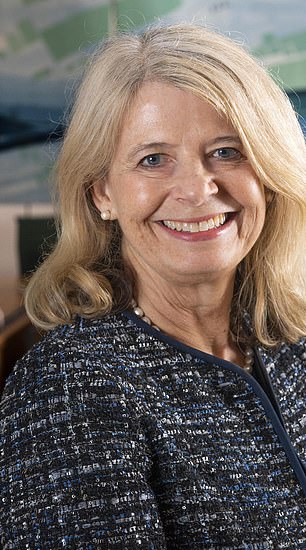<!–
<!–
<!– <!–
<!–
<!–
<!–

Experience: Treasury Select Committee Chairwoman Harriett Baldwin had a 20-year career with the city.
Our financial services sector is world-leading and well-paid. It is a part of the economy that benefits women and men across the UK and its growth, competitiveness and profits depend on attracting and retaining the best people.
I enjoyed a successful 20-year career in the City before politics, so I am no stranger to the issues affecting women in financial services.
Much has changed since then, but you only need to look at the woefully low number of female CEOs in finance to see that there is room for improvement.
In 2016, when I was City Minister, I shed light on the issue by launching the Women in Finance Charter, which now has more than 400 signatories covering more than 1 million employees.
Before my time on the Treasury select committee in 2018, it was discovered that there was a toxic alpha male culture in the city that made it difficult for talented women to progress.
Now, with me as chair, our committee decided to take a second look to see what has changed (or what hasn’t changed) in the last six years.
Unfortunately, what we have discovered is that the answer is not much. In fact, progress moves at a snail’s pace.
We spoke to industry leaders, regulators, women’s advocacy groups and government ministers to understand what they were doing about it. However, what was really crucial was understanding reality.
We hosted a private event with women who had worked at all levels and areas of financial services.
Their evidence was anonymous, allowing them to share honest experiences of working in a male-dominated industry without fear of reprisal.
We were horrified. The women described their experiences of misogyny, sexual harassment and intimidation, including serious sexual assault and rape.
We received particularly disturbing testimony about confidentiality agreements, which we were told companies were using to cover up sexual harassment.
This not only silences victims of abuse, but also leaves the door open for perpetrators to continue abusing with impunity.
I firmly believe that companies must take responsibility for addressing sexism in the city. Boardrooms and senior managers should not have to go to government or regulators before acting to give women fair treatment.
If boardrooms realized that an employee was diverting profits, would they wait for an authority figure to tell them that this was wrong and that they should act? Of course not.
It’s not all pessimism. We saw some incremental improvements on issues such as the gender pay gap and female representation in senior positions. But it’s not enough.
A recent BlackRock study showed that gender-balanced companies outperform their peers, demonstrating the competitive advantage offered when efforts are made to attract and retain great people.
Some progress has been made, but there is still much to do. The city must be able to draw on the widest talent pool possible and boardrooms must play their part in eradicating the sexist culture that still pollutes some corners of the industry.
Not doing so is not only immoral, it is also bad for business.
Harriett Baldwin is the Conservative MP for West Worcestershire and chair of the Treasury Select Committee.
